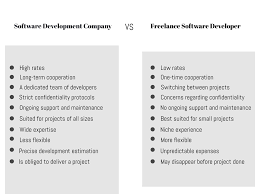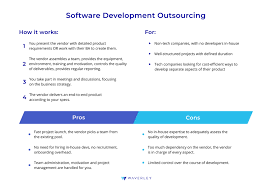Empowering Business Excellence: The Role of an ERP Software Development Company
ERP Software Development Company: Revolutionizing Business Operations
In today’s fast-paced business environment, organizations are constantly seeking ways to streamline their operations, improve efficiency, and enhance productivity. This is where Enterprise Resource Planning (ERP) software comes into play. An ERP software development company plays a crucial role in helping businesses integrate and automate their core processes.
ERP software is designed to centralize data and processes across various departments within an organization, providing a unified platform for managing resources, enhancing collaboration, and making informed decisions. With the help of an ERP system tailored to their specific needs, companies can optimize their workflows, reduce manual tasks, and gain real-time insights into their operations.
The Role of an ERP Software Development Company
An ERP software development company specializes in creating customized ERP solutions that align with the unique requirements of each client. These companies employ skilled developers, analysts, and project managers who work closely with businesses to understand their processes and design a system that addresses their pain points.
From initial consultation to implementation and ongoing support, an ERP software development company guides organizations through every stage of the ERP software development lifecycle. They ensure that the solution is scalable, user-friendly, and seamlessly integrated with existing systems.
Benefits of Working with an ERP Software Development Company
Collaborating with an ERP software development company offers several advantages for businesses:
- Customization: Tailored ERP solutions that meet specific business needs.
- Efficiency: Streamlined processes and automated workflows for increased productivity.
- Scalability: Solutions that can grow with the business and adapt to changing requirements.
- Data Insights: Real-time analytics and reporting capabilities for better decision-making.
- Sustainability: Ongoing support and maintenance to ensure optimal performance.
In Conclusion
An ERP software development company plays a vital role in helping businesses leverage technology to optimize their operations and drive growth. By partnering with a trusted provider of custom ERP solutions, organizations can unlock new opportunities for efficiency, innovation, and success in today’s competitive landscape.
6 Essential Tips for Developing Effective ERP Software Solutions
- Understand the specific needs and requirements of clients before starting development.
- Ensure the ERP software is scalable to accommodate future growth and changes.
- Implement robust security measures to protect sensitive business data.
- Regularly update and maintain the ERP software to keep it efficient and secure.
- Provide comprehensive training and support for clients to maximize user adoption.
- Collaborate closely with clients throughout the development process to ensure alignment with their goals.
Understand the specific needs and requirements of clients before starting development.
To ensure the success of ERP software development projects, it is essential for an ERP software development company to thoroughly understand the specific needs and requirements of their clients before initiating the development process. By taking the time to gather comprehensive insights into the client’s business processes, challenges, and goals, the development team can tailor a customized ERP solution that perfectly aligns with the client’s objectives. This client-centric approach not only enhances the effectiveness of the ERP system but also fosters a collaborative partnership that leads to long-term success and satisfaction for both parties involved.
Ensure the ERP software is scalable to accommodate future growth and changes.
It is essential for an ERP software development company to ensure that the ERP solution they create is scalable to accommodate future growth and changes within an organization. By designing a scalable system, businesses can easily expand their operations, add new functionalities, and adapt to evolving business requirements without the need for a complete system overhaul. Scalability in ERP software allows companies to stay agile and competitive in a dynamic business environment, enabling them to leverage technology as a strategic asset for long-term success.
Implement robust security measures to protect sensitive business data.
It is crucial for an ERP software development company to implement robust security measures to safeguard sensitive business data. By prioritizing data protection, such as encryption, access controls, and regular security audits, the company can mitigate the risk of cyber threats and unauthorized access. Ensuring the confidentiality, integrity, and availability of data not only builds trust with clients but also demonstrates a commitment to maintaining a secure environment for critical business information.
Regularly update and maintain the ERP software to keep it efficient and secure.
Regularly updating and maintaining your ERP software is essential to ensure its efficiency and security. By staying current with software updates, you can benefit from improved performance, new features, and bug fixes that enhance the overall functionality of the system. Additionally, keeping your ERP software up-to-date helps protect against potential security vulnerabilities, ensuring that your sensitive business data remains safe and secure. Prioritizing regular maintenance and updates for your ERP software is key to maximizing its effectiveness and safeguarding your business operations.
Provide comprehensive training and support for clients to maximize user adoption.
To maximize user adoption of ERP software developed by a company, it is crucial to provide comprehensive training and support for clients. By offering thorough training sessions and ongoing support, businesses can ensure that users understand the system’s functionalities and benefits. This proactive approach not only boosts user confidence but also enhances overall productivity and efficiency within the organization. Investing in training and support demonstrates a commitment to customer success and helps clients fully harness the power of their ERP solution for long-term success.
Collaborate closely with clients throughout the development process to ensure alignment with their goals.
Collaborating closely with clients throughout the ERP software development process is essential to ensure alignment with their goals and objectives. By maintaining open communication and involving clients in key decision-making stages, an ERP software development company can tailor the solution to meet the specific needs of the business. This collaborative approach not only fosters a deeper understanding of the client’s requirements but also builds trust and ensures that the final product aligns seamlessly with their strategic vision, ultimately leading to a successful implementation and long-term satisfaction.





